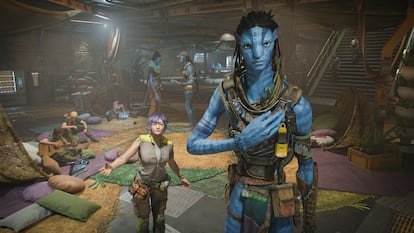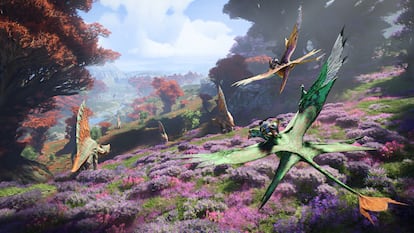‘Avatar’ makes the leap to video games: the key to conquering popular culture
The film comes to interactive media, epitomizing how companies are cementing their role as multimedia franchises able to triumph across various formats


In Manhattan Beach, Los Angeles, on the immense ship that is James Cameron’s Lightstorm Entertainment production house, there is a storage room full of the scale models that have been used in his most iconic films. Here rests the threatening metallic skeleton of Terminator 2 (1991), the terrifying sculpture of the mother alien used in Aliens (1986) and the mock-up of the engine room that was used to film the interior of Titanic (1997). In the middle of this impromptu museum, an anthropomorphic, golden statuette, well-worn from having been passed hand to hand for 26 years, reads: Best Picture.
“In the movie theater, our world of Pandora is impressive, but now you can see Pandora with your own eyes, explore it, touch a plant and see how it reacts. You can be there!”, says the owner of this Oscar, Jon Landau, producer of Titanic, Avatar (2009, the highest-grossing film ever) and of its sequel (2022). Now, he’s also an advisor of its video game Avatar: Frontiers of Pandora, developed by Lightstorm and the French videogame giant Ubisoft. The game, which goes on sale December 7 and expands the universe of the giant blue na’vi, embodies to perfection how popular culture is increasingly turning to multimedia products that branch out into all kinds of formats: from movies to board games, comics to toys.
“We wanted to know what they could do with our world. We promised to help and advise, make sure that everything was coherent, but not interfere with the game,” says Landau, clad in a Hawaiian shirt and the sardonic wit of someone who knows the ropes of the audiovisual business. “In terms of bringing together film and videogames, we were going to the Wild West, towards a new frontier: two different traditions, two different cultures that come together. But it was a natural step, because it’s clear that spreading a franchise across multiple kinds of media is fantastic when it comes to getting the public involved. And video games are at the pinnacle of it all”, he says in Lightstorm’s Los Angeles headquarters, where EL PAÍS was invited by Ubisoft. “If something was good for the game, that wasn’t good enough: it had to be good for the movie also. Because of course, there are elements that go into the game that will influence the franchise,” Landau says of the process of creating the game. Perhaps this is the key to the entire process.

Independent of their source material, the most successful franchises (Lord of the Rings, Harry Potter, Star Wars, Marvel, James Bond…) look for expansion opportunities in the form of books, movies, series, toys, theme parks, comics and every other format imaginable. At the head of this pack, Pokemon, the most profitable franchise in history, has earned more than $98 billion across all formats since 1996. Proof of this trend’s impact on popular culture lie in the two highest-grossing films of the year, which fit its mold to perfection: Barbie, which was born as a doll and has extended its presence to series and comics: and Super Mario Bros, which even before its cinematographic debut had expanded its universe to include video games, series, dolls and theme parks. Not to mention that yet another intellectual property born in the world of video games, The Last of Us, has become this year’s standout television series. Avatar, which has assumed forms from comics to Legos, is the latest franchise to board the multimedia train, which it means to ride into the hearts of all kinds of audiences. And its assault on videogames is its trump card.
“The game has a more leisurely pace. It’s not like the movie, which is locked into a run time; here you can take the time to create objects that people will experience at their own pace. There are fights, but you’ll also interact with flora and fauna”, says Magnus Jansén, creative director of Massive, the Swiss studio that forms part of Ubisoft and that is taking the lead on the game. Jansén unfurls the history of the game, which has the same anti-colonialist sentiment as the films, but emphasizes its desire to go even further. In terms of gameplay, Frontiers of Pandora invites us to take control of a na’vi traumatized by an experiment and who, after the events of the second movie, confronts the human colonizers who remain on the planet. The game, in terms of action, replicates many of the hallmarks of Ubisoft’s other first-person titles like FarCry, but it also pushes the player towards exploring a world that has been recreated with much attention to detail and attempts to be fully immersive. “We had to be experts in this world, know its languages, understand the ethos that gave birth to its costumes, landscapes, everything”, said Jansén.
This ethos that Jansén refers to has a very concrete guardian. “I am the one who is responsible for everything making sense, that it all be canon. I am the Avatarpedia,” Josh Izzo says, laughing. He holds a new position destined to be replicated in the future of popular culture: franchise manager. “I organize and sign off on everything that is related to Avatar besides its movies, which are run by Jon [Landau] and Jim [Cameron]. But everything has to fit into their vision, everything has to line up, from marketing to the theme parks”. Izzo says that the level of control over the franchise exercised by Cameron is extreme: he even maintains a list of all the people who remained on planet Pandora after the second movie. “That’s who we had to work with. They’re the pieces we can use”.

Jennifer Bartram, the game’s narrative coordinator (its screenwriter, you could say), defines herself as “the bridge between Lightstorm and Massive”. “We supervise all content, so that not just the story, but the game’s every corner is of a certain quality and fits into its overall ecosystem”. Because it’s no longer just about a plot twist. Details must be supervised so that there’s nothing out of place. There are new animals (prey and predator, herbivores and carnivores), new locations, new characters and, most definitely, new ideas that have to “line up” with the main storyline.
The game introduces ideas that will remain in the universe, to be explored by other mediums. For example, three new na’vi clans: one that is peace-loving, that lives in symbiosis with some moths; a nomadic group that raises giant, elephant-like creatures on vast grasslands; and others who specialize in camouflage and live in a misty forest. We’ll see all of these ideas, which in the game serve as narrative appetizers, developed in the franchise’s upcoming movies. “From what the humans who live on the planet eat to the behavior of its animals, everything has to be gone over with Josh (Izzo), so that it all fits,” says Bartram. “Nothing in our world comes out of nowhere, everything is planned and has a function,” says Izzo himself.
“The movie industry has changed a lot, and it’s time to innovate”, says Landau, lounging on a sofa as he ponders his response. “In the making of this game, both companies have embraced a sincere collaborative space from which the franchise will benefit. The video games and movies continue to be distinct products: in a movie, you tell the audience where to look, you have absolute control over the experience. In games, you hand over that control to the player”, he says. “But it’s clear that the future of film and that of video games is related. And it’s very exciting to be present at the birth of this relationship.”
Sign up for our weekly newsletter to get more English-language news coverage from EL PAÍS USA Edition
Tu suscripción se está usando en otro dispositivo
¿Quieres añadir otro usuario a tu suscripción?
Si continúas leyendo en este dispositivo, no se podrá leer en el otro.
FlechaTu suscripción se está usando en otro dispositivo y solo puedes acceder a EL PAÍS desde un dispositivo a la vez.
Si quieres compartir tu cuenta, cambia tu suscripción a la modalidad Premium, así podrás añadir otro usuario. Cada uno accederá con su propia cuenta de email, lo que os permitirá personalizar vuestra experiencia en EL PAÍS.
¿Tienes una suscripción de empresa? Accede aquí para contratar más cuentas.
En el caso de no saber quién está usando tu cuenta, te recomendamos cambiar tu contraseña aquí.
Si decides continuar compartiendo tu cuenta, este mensaje se mostrará en tu dispositivo y en el de la otra persona que está usando tu cuenta de forma indefinida, afectando a tu experiencia de lectura. Puedes consultar aquí los términos y condiciones de la suscripción digital.








































